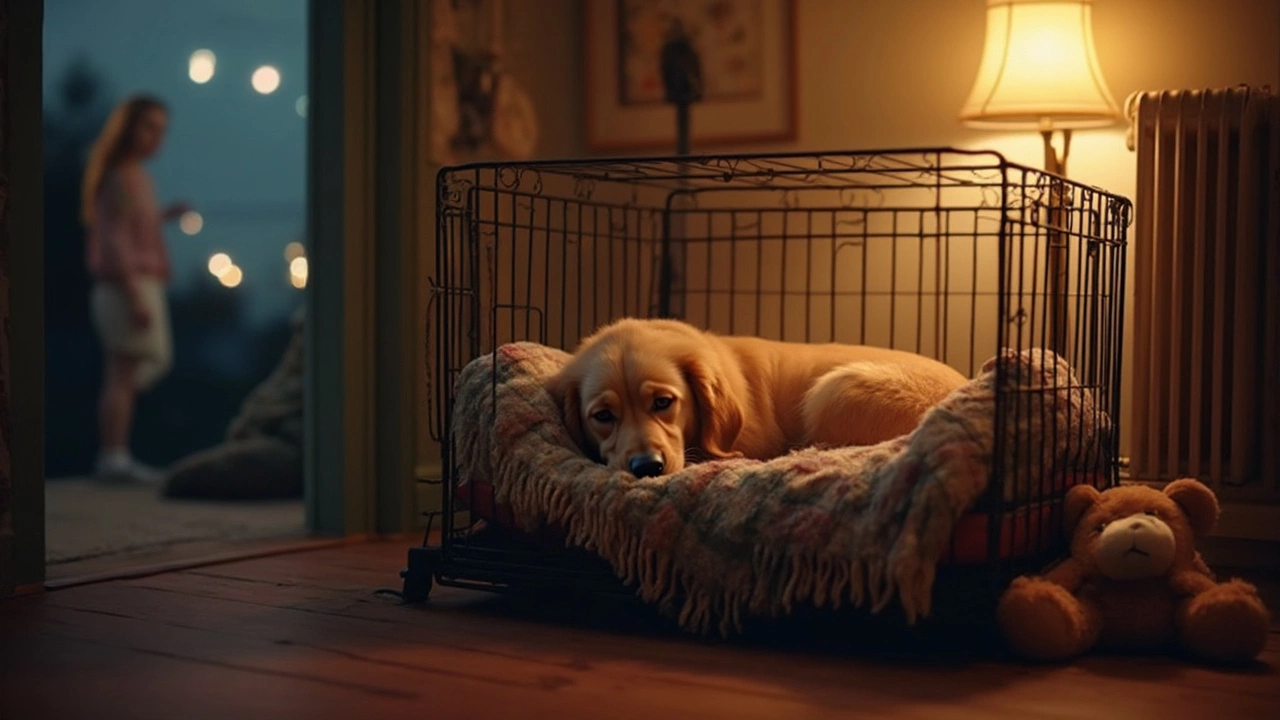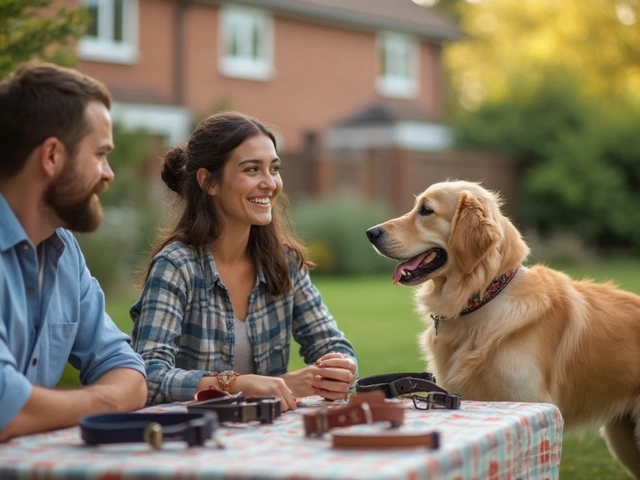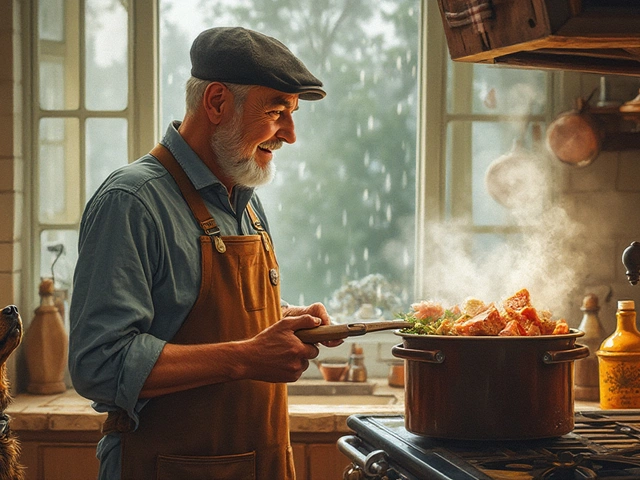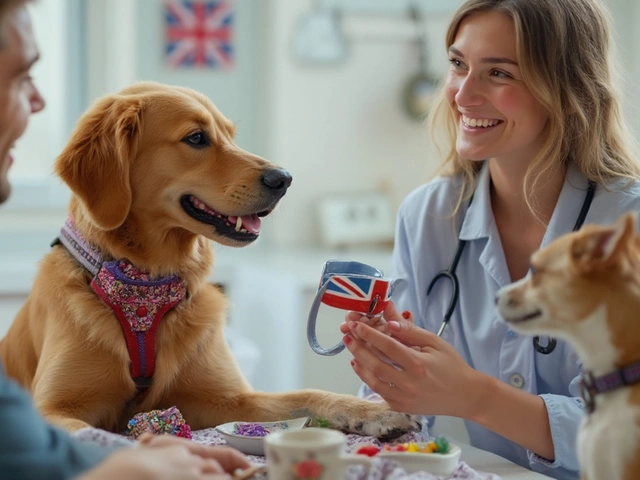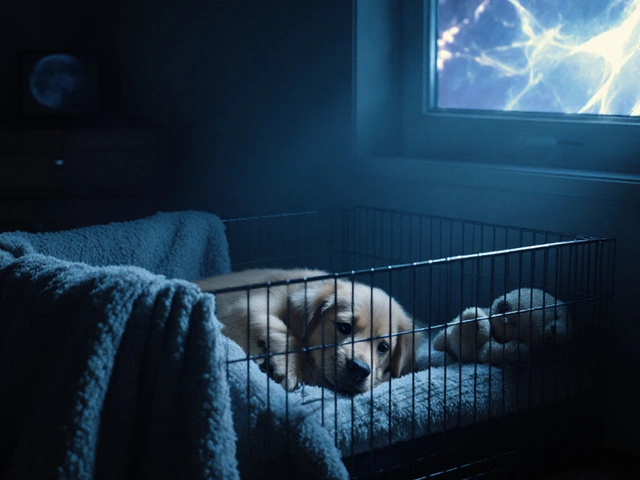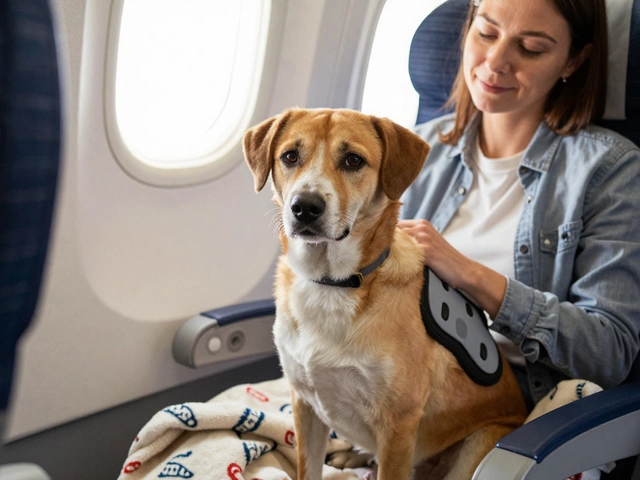If you're picturing a silent night because your tiny puppy is finally home, get ready for some surprises. At 8 weeks old, puppies are basically babies. Their bladders are as small as thimbles, so the odds of them holding it for eight hours straight are pretty slim. Most pups this young can last maybe three to four hours before nature calls, even in the middle of the night. Waking up to let them out is just part of the deal early on.
That first week is always a mix of excitement and exhaustion. If you try to skip nighttime potty breaks, you're risking accidents in the crate and a stressed-out pup. But there are ways to make those nights less chaotic. Crate training works best when it's cozy, calming, and paired with a few tricks to keep your puppy focused on sleep, not escape or whining.
And let's not forget why toys matter. A soft, safe chew toy can do wonders for helping a puppy feel secure. But don’t just toss in any toy—some can break apart or become choking hazards if your pup gets bored in the middle of the night. Choosing toys designed for young puppies keeps things safe and makes the crate feel more inviting.
- Typical Sleep Patterns for 8 Week Old Puppies
- How Long Can Puppies Hold Their Bladder?
- Making the Crate Comfortable
- Choosing the Best Toys for Overnight
- Tips for Easing Nighttime Crate Anxiety
- What to Do If Your Puppy Can't Hold It
Typical Sleep Patterns for 8 Week Old Puppies
If you’re looking for one guarantee about bringing home an 8 week old puppy, it’s this: they sleep a LOT, but not all at once. Most young puppies clock in around 18 to 20 hours of sleep every day, broken up into chunks. They aren’t wired for a full night’s snooze like adult dogs or humans. Instead, their sleep looks more like a toddler’s—with naps all over the place.
During the night, don’t expect them to just power down and give you eight solid hours. Usually, they’ll wake up every 2 to 4 hours. Their bodies simply aren’t built to hold a full night’s rest or keep a full bladder. If they wake up groggy, fussy, or raring to play at 3 a.m., that’s totally normal at this stage.
"At eight weeks, a puppy’s sleep cycles are short and unpredictable. Most puppies can’t sleep through the whole night until around 16 weeks." — American Kennel Club
New puppy parents often ask about whining or restlessness at night. Honestly, this is common for puppy overnight routines. Puppies miss their littermates and mom, so the first few nights are bumpy. Keep in mind:
- Don’t be surprised if your puppy wakes up multiple times overnight needing comfort or a bathroom break.
- Daytime naps will happen anywhere and everywhere—in their crate, on your shoes, or sprawled in the living room.
- Active play right before bedtime helps burn off energy and may lengthen nighttime sleep, even if only a little.
Here’s a rough breakdown of sleep behavior for 8 week old puppies:
| Time | Typical Sleep Duration | Notes |
|---|---|---|
| Night | 6-8 hours (with 1-2 potty breaks) | Rarely sleep through the night without waking |
| Daytime | Multiple naps, totaling 10-12 hours | Short, scattered naps are normal |
If you’re building your puppy crate training routine, work with their natural sleep schedule instead of forcing them into yours. That approach saves your sanity and helps your dog get the rest they need for healthy growth.
How Long Can Puppies Hold Their Bladder?
This is probably the biggest question for anyone starting puppy crate training. A lot of people assume puppies can go all night without a break, but that's just not how it works. The truth is, most 8 week old puppies can only hold their bladders for about 2 to 4 hours at best. They don’t have full control yet, and accidents are basically guaranteed if you stretch it longer.
A good rule of thumb vets repeat is: one hour for each month of age, plus maybe an hour extra if you’re lucky. So, for an 8 week (2 month) old pup, you're usually working with a 3-hour max stretch. It’s not an exact science—some will last longer, some less, especially at night when their bodies slow down. But don’t count on that straight away.
Here’s a quick breakdown to help set expectations:
| Age | Max Hours Holding Bladder (Night) |
|---|---|
| 8 weeks (2 months) | 3 - 4 hours |
| 12 weeks (3 months) | 4 - 5 hours |
| 16 weeks (4 months) | 5 - 6 hours |
| 6 months | 7+ hours |
If you find your 8 week old puppy wakes up whimpering in the crate, that’s probably their way of saying, “Hey, I can’t hold it anymore.” Ignoring this can lead not just to messes in the crate, but also slow down house training. Listening when your pup whines at night might interrupt your sleep, but it helps them get the hang of going outside, not in their crate.
So, to avoid stress (and laundry), set an alarm and plan for one or two nighttime potty trips those first few weeks. With patience, your puppy will make it through the night sooner than you think.
Making the Crate Comfortable
If you want your 8 week old puppy to actually use the crate and not turn it into a howl-fest, comfort is everything. At this age, puppies are missing their littermates and their mom, so the goal is to make this new space as welcoming as possible.
- Bedding matters: Choose soft, washable blankets or a puppy bed, but nothing too fancy—accidents are almost guaranteed in the first couple of weeks.
- Familiar smells: Bring home a blanket or toy from the breeder if you can. The familiar scent calms your puppy and helps with that first-night anxiety.
- Size it right: The crate shouldn't feel like a cave. Your pup only needs enough room to stand up, turn around, and lie down. Anything bigger and they’ll try to use one side as a bathroom.
- Temperature check: Keep the crate away from drafts or direct heat. Puppies can't regulate their body temperature well, so make sure they're not too cold or hot.
Throw in a safe chew toy designed for puppies. This helps with teething and gives them a distraction if they wake up during the night. Some people find that placing a ticking clock nearby mimics a heartbeat and helps calm the pup, but skip any old clocks with loose parts that could chew off.
While most puppy crate training guides focus on routine, don’t ignore location. Try setting the crate up in your bedroom for the first few nights. Your presence helps soothe your pup and makes those midnight potty runs a lot easier. Over time, you can move the crate to a quieter spot where you want them to sleep long-term.
| Comfort Item | Purpose |
|---|---|
| Washable bed/blanket | Soft, cozy, easy cleanup |
| Safe chew toy | Distraction and teething relief |
| Breeder's blanket/toy | Familiar scent, reduces stress |
| Ticking clock (optional) | Mimics heartbeat, soothes |
Making the crate comfortable isn't just about coddling your puppy. A cozy, inviting space leads to less whining, quicker crate training, and way fewer headaches during those early nights.
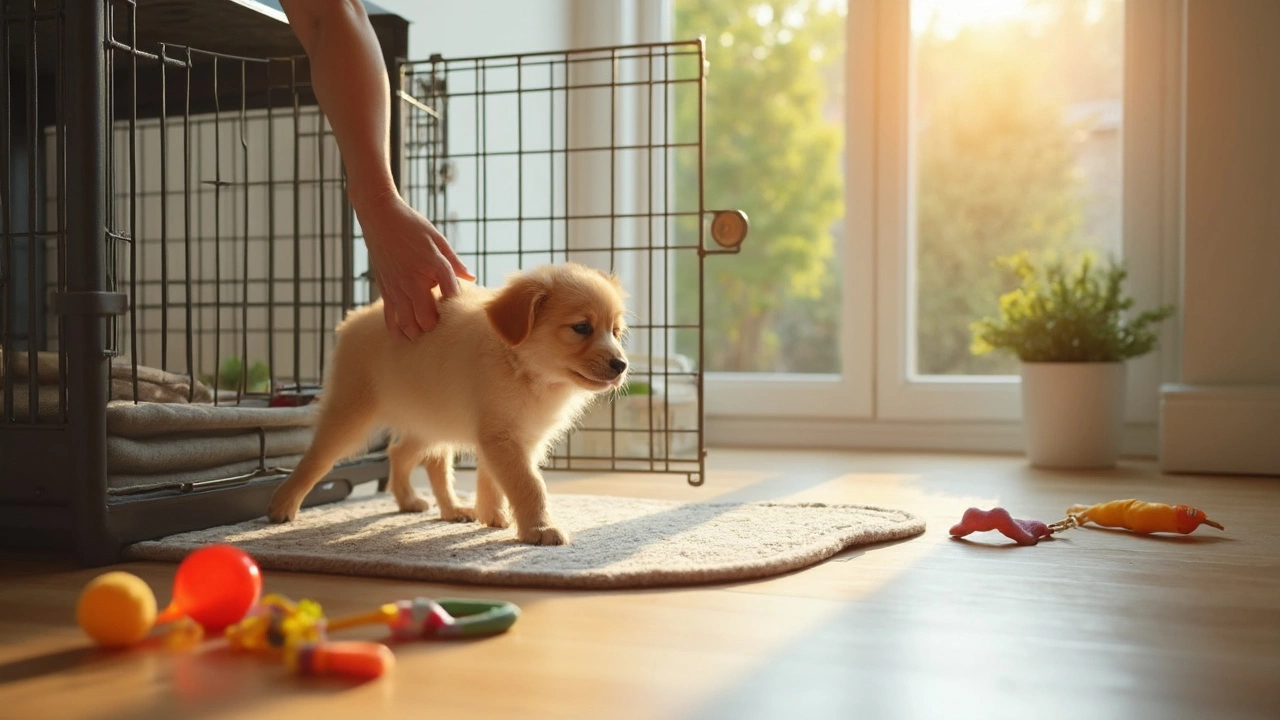
Choosing the Best Toys for Overnight
The right toy can be a game changer when it comes to crate training your 8 week old puppy. They aren’t just entertainment—overnight toys help settle nerves and keep those tiny teeth off your furniture. But not every toy on the shelf is safe or right for a restless pup still figuring out life in a crate.
Go for toys made specifically for young puppies. Soft, plush options like the Snuggle Puppy—with a heartbeat sound and heat pack—are popular because they mimic the comfort of snuggling with mom or littermates. This can help cut down on whining and help your puppy relax. Chew-safe rubber toys (like the puppy version of a Kong) are also great picks. You can stuff one with a little smear of puppy-safe peanut butter or their regular kibble. This keeps your pup busy and distracted if they’re having trouble settling down overnight.
- Stick to toys that are labeled for puppies under 3 months—these are usually softer on their developing teeth but sturdy enough not to break apart easily.
- Stay away from anything with squeakers that could become choking hazards if your puppy chews them out.
- Skip rope toys or toys with long strings. Puppies can get tangled or try to swallow loose fibers—definitely not what you want overnight.
- Check toys regularly for wear and tear. Even the toughest teething toys can get shredded surprisingly fast by a determined puppy.
Here’s a quick rundown on what people actually choose for young pups in their crates:
| Toy Type | Safe for Overnight? | Extra Tips |
|---|---|---|
| Plush Puppy Toy (with heartbeat) | Yes | Helps reduce anxiety and whining |
| Puppy Kong | Yes | Freeze for longer lasting distraction |
| Rope Toy | No | Risk of swallowing threads |
| Basic Chew Stick | Sometimes | Only if marked for puppies and size-appropriate |
| Squeaky Toy | No | Choking hazard |
Switch things up if you notice your puppy isn’t interested or if one toy starts looking beat up. Keeping things fresh helps during the first few months, making both crate time and puppy overnight routines go smoother for everyone.
Tips for Easing Nighttime Crate Anxiety
The last thing you want is your 8 week old puppy spending the night whining or scratching at the crate. Crate anxiety is totally normal, but you can help your puppy feel safe and even enjoy their little den. Here’s what actually works for most folks with a young pup.
- Keep the crate by your bed. Puppies settle down faster when they know you’re nearby. Just hearing you breathe can be enough to calm their nerves during those first few weeks.
- Use a familiar smell. Toss in a soft t-shirt you’ve worn, or a blanket from their old home. Puppies get comfort from familiar scents and will relax more easily with something that smells like you.
- Create a calming routine. Do the same activities right before bedtime. Quick potty break, quiet cuddle, then crate time. Dogs thrive on routine—even little ones.
- Don’t overdo the goodbyes. Making a big fuss when crating your puppy overnight can ramp up anxiety. Be casual and confident instead of dramatic.
- Pick the right toy. Safe chew toys or a snuggle puppy with a heartbeat (they actually exist!) can help your pup stay comforted, especially if they wake up alone in their crate.
Some puppies cry the moment you shut the crate door. If it’s just a few whimpers, ignore it so you don’t encourage a nightly routine of fussing. But if your pup gets frantic, check for a real need—like a bathroom break. If you let them out, keep it boring: no play, just potty, then straight back in.
Got a persistent barker? Try covering part of the crate with a towel, which can make it feel cozier and block out distractions. Just be sure the towel can’t get pulled inside for chewing.
| Common Triggers | How to Help |
|---|---|
| Loud household noises at night | Move crate to a quieter spot |
| Puppy too cold or hot | Adjust bedding and crate location |
| Hunger or thirst | Feed dinner no less than an hour before bedtime, and offer water up to an hour before crating |
Consistency really is your best friend when you’re teaching your little one to chill out at night. Every bit of calm now pays off when you want them snoozing through the night later on.
What to Do If Your Puppy Can't Hold It
No shame here—most 8 week old puppies can't make it through an entire night in their crate without a potty break. If your pup is whining, scratching, or has accidents, it’s just part of raising a baby dog. Here’s what you should actually do instead of hoping for a miracle.
First, accept that these middle-of-the-night bathroom trips are normal. Young puppies simply don’t have muscle control yet. According to the puppy crate training rule of thumb, a puppy can hold it for about one hour for every month of age. So at 8 weeks, expect to take them out every 2-3 hours—yep, even at 2:00 AM.
- Set an alarm before your puppy wakes you. This way, you’re in control and accidents are less likely.
- Keep nighttime potty trips boring—just out, quick pee, and back. No playtime, no chatting. This teaches your puppy that nighttime is for sleeping, not exploring.
- Be consistent. Your 8 week old puppy will learn the routine faster if you stick with it.
- If you wake up to a wet crate, don’t scold. Quietly clean up, change the bedding, and try again next night.
Sometimes, using a playpen with potty pads overnight can save your sanity, especially if you live in an apartment or can’t get outside easily. But be careful—if you go this route for too long, your pup might get too used to peeing indoors and make house training harder down the line.
| Age | Average Hold Time (Hours) |
|---|---|
| 2 months | 2-3 |
| 3 months | 3-4 |
| 4 months | 4-5 |
Always toss a safe puppy overnight toy in the crate to keep your puppy calm. But skip the plush toys that rip apart easily or anything with small pieces. Sturdy, chew-safe puppy toys make those wakes-ups easier to handle and keep your pup busy after they’ve done their business.

